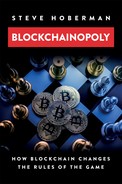Transparency

Documents and services focused on proving that something is true—such as notary services, licenses, and permits—rely on processes of attestation. Today these processes of attestation are heavily people-intensive, error-prone, and relatively expensive.
A blockchain application focused on attestation would record information about the actual event or document, along with date information. This immutable record provides proof of existence. With this relatively simple act, we can remove or redirect certain government agencies and intermediaries (such as notaries) in the attestation process.
For example, there already exists a service called Virtual Notary which provides a certificate, which is a hash of an actual file such as an email, statement, or contract. These supporting files can be in any format, such as Microsoft Word, PDF, JPG, or even PowerPoint.
A blockchain application for attestation would make “proof of existence” and “proof of ownership” a more self-serve process. Citizens would invoke smart contracts to perform services that today are carried out by government agencies or attestation intermediaries.
Streamlining

I recently had to go to my county’s Hall of Records to obtain some information on a deed. The process was so people-intensive. Not to mention all of the space needed for the aisles and aisles of large red binders that contained paper records dating back to 1794!
A blockchain application could make it much easier for citizens to access public records. All of the public documents mentioned earlier under the Transparency section could be easily accessed without reliance on a government intermediary.
Delaware is currently moving its states archival records to blockchain.16 Several countries including Dubai are also moving their paper storage and retrieval systems to blockchain.17
A blockchain application that provides storage and retrieval of public records is equivalent to a distributed and easily accessible content management system.
Privacy

Most electronic voting systems today are centralized. Therefore, the company that built the voting software has a powerful intermediary role, and could theoretically influence election results.
With blockchain, the clunky voting machines and software are gone. Voting transactions are recorded in the immutable ledger and can be automatically tallied using smart contracts.
There is a startup called Follow My Vote that is building the first online voting software based on blockchain technology.18
The biggest challenge with moving the voting process to blockchain will be good old-fashioned stubbornness. Just like with any new process, most voters will be more comfortable voting the way they always have. A simple graphical user interface and short training tutorials could make the transition easier.
Permanence

The current process to purchase real estate (e.g. a house or land) is incredibly paper-intensive and prone to error. So many people are involved, such as real estate agents, town employees in departments such as zoning and building codes, and real estate attorneys. With so many people involved and lots of money at stake, buying real estate can be a very stressful process.
A blockchain application can help by storing all relevant documents in one step, in an immutable format. Smart contracts could be used as process management tools, to quickly start one process when another finishes. This type of application is a workflow application—a perfect fit for blockchain.
Documentation (including land registries, zoning violations, and property titles) can be stored in the blockchain ledger for easy access. Ghana is one of the countries that has implemented a land registry system using blockchain, in order to prevent corruption and foul play.19
Sweden is working on a system to place real estate transactions using blockchain so that buyers, sellers, and financial institutions can track the real estate purchase process.20
Distribution

There is a town near me where parking is an issue, and therefore many parking spots have meters. People put money in the meters and are given a certain amount of time to park. If the time lapses this person could be given a parking ticket.
I parked recently at a metered spot, and had only two quarters, which gave me 40 minutes. My appointment lasted closer to an hour, so in addition to the stress of rushing to my car, I worried if I would receive a ticket.
A blockchain application can definitely help in this process. Someone parks a car in a metered spot. The meter scans a QR code which represents the person’s digital currency address. The person is then charged to park. The person is charged for the duration of the parking event. No more running out of time in a meter, or feeding the meter with extra coins and leaving the parking spot with money in the meter.
Yet again, though, incentive would prove a challenge. What incentive would municipalities have for switching to a metering blockchain application? Currently, many towns make substantial revenue off of tickets, and this application would remove tickets altogether. However, salaries would be saved, because the police would not have to monitor meters.
